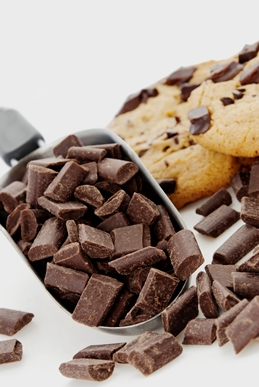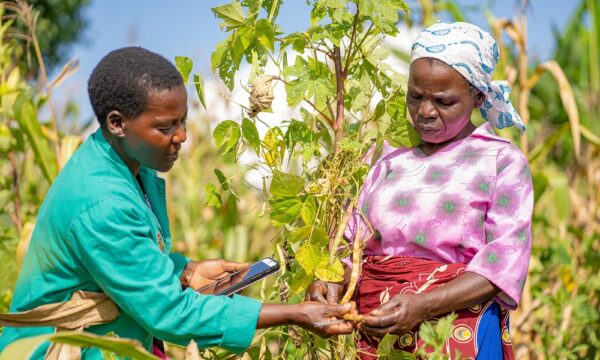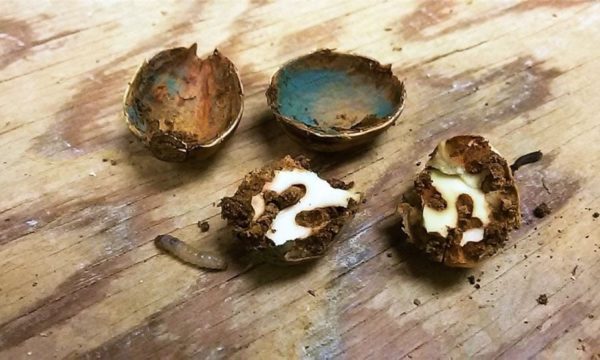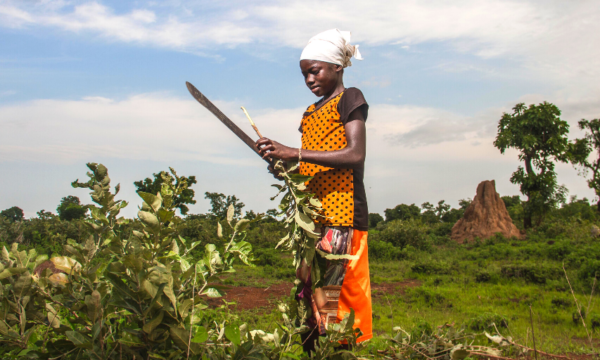This blog is about the weirdness of global trade… and the
lengths (literally) we go for chocolate.
The wrapper on my Marks & Spencer (M&S) valentine chocolates read: “Made with our exclusive British Milk chocolate recipe, Made in
South Africa”.
Incredibly, it seemed that a firm in South Africa (SA) was targeting local people with a taste for British chocolate, and somehow M&S
sourced them for sale in the UK!
Was this I wondered another example of fuel miles not being
built into food production costs (see “food miles”), like apples from the Cape or Kenyan flowers at petrol stations?
I had better explain the significance of “British
milk chocolate recipe”: this almost certainly meant similar to Cadburys, founded in
the UK over 200 years ago, and it is a very different product from non-UK sources of chocolate.
A lot of effort goes into producing your chocolate bar and
that’s clear from CABI’s own work. CABI spends much time & expertise on supporting cocoa
production and trade, and in CAB abstracts, our agricultural research database,
there are 8314 records specifically indexed with cocoa). A swathe of unique cabicodes
is devoted entirely to human food production & cocoa is categorised under them. WE have 41 indexing terms that specifically mention
cocoa, most of which are pathogens and pests. They are all needed!
But I’m a public health editor so what’s in CABI’s Global Health? WE have 1118
records on the nutritional/clinical aspects of chocolate consumption and here
are some interesting ones:
Health negatives
- Obesity: Brisk
walking reduces ad libitum snacking in regular chocolate eaters during a
workplace simulation. - Contamination of the raw material or in
chocolate production: Cadmium dietary
exposure in the European population.
Health benefits
- Chocolate-a-day keeps the docter away: The effectiveness and cost
effectiveness of dark chocolate consumption as prevention therapy in people at
high risk of cardiovascular disease: best case scenario analysis using a Markov
model.
Back to: are food miles being saved or wasted?
The concept of food miles (i.e. true cost of food
production must factor in the cost of transport fuel; reduction being achieved
by grow locally/eat locally) can’t truly be applied to cocoa itself for us Brits
who want to eat chocolate, as cocoa doesn’t grow anywhere but the tropics. But they could be applied to the other
ingredients. I put on my deerstalker hat and went investigating.
Where is cocoa grown? It turns out that 70% of world cocoa
is produced in WEST Africa (Ghana, Nigeria, Cameroon, Cote D’Ivoire, all
members of International Cocoa Organisation ICCO). The beans stayed on the same continent at least.
Where did the sugar & milk come from? Potentially the
same continent, and our Dairy Science editor assured me the milk is as safe as it would be from the UK. SA is a significant producer &
exporter of milk (powdered).
Food safety concerns also affect cocoa itself: the harmful effects of pesticides residues, Ochratoxin
A, Polycyclic Aromatic Hydrocarbons, Free Fatty Acids and heavy metals such as
lead and cadmium led to the creation of Sanitary and Phytosanitary (SPS)
standards by cocoa importing countries (EU, USA and Japan) in 2008. All their
imported cocoa must meet these standards or be turned away. [CABI & our dB
CAB Abstracts play key roles in global SPS and pre-2008, we worked in West
Africa to identify the pesticides being used & to advise the smallholder farmers
on changing practice to meet the new standards so that their cocoa trade was
not adversely affected]
My research (strangely) has convinced me that chocolate
produced in SA for export could save food miles, for it’s made on the same continent
where all raw materials can be sourced.
I’ve talked myself into the sense of valentine chocs from South
Africa but I just can’t get over the necessity to declare “British milk
chocolate recipe” on the packaging
I’m left with new questions:
- Where did the cocoa, milk and sugar actually originate
so I can work out the fuel miles saved to SA and from there to UK - What were the in-country safety standards they had
to pass? - Why weren’t these Fairtrade? (We don’t know how
much the farmers got for producing the cocoa, milk and sugar; Cadburys dairy
milk has been Fairtrade
since 2009) - Were these M&S valentine chocolates the
result of a considered export strategy
….OR am I right with my original assumption that the
M&S wine buyer, sourcing wine over there, had a light-bulb moment when they
came across valentine chocs for homesick Brits?
Serendipity rules.
Related articles
Related News & Blogs
CABI scientist co-authors latest edition of Pesticide Use in Cocoa manual
Spraying pyrethroid insecticide CABI scientist Dr Jayne Crozier has co-authored the 4th Edition of the Pesticide Use in Cocoa manual published by the International Cocoa Organization (ICCO) in close cooperation with the cocoa industry. Dr Crozier, who…
4 July 2023











